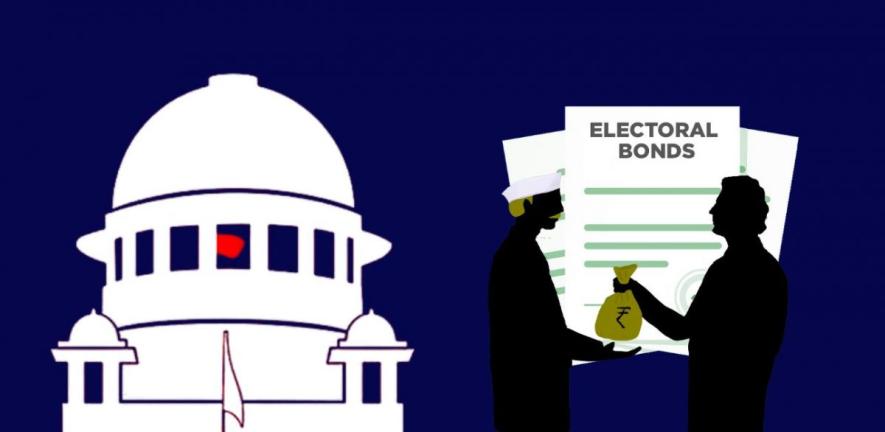SC Declares Electoral Bonds Unconstitutional, Asks SBI to Stop Sale

Today, the Supreme Court pronounced a unanimous verdict declaring the 2018 electoral bond scheme unconstitutional.
A Constitution Bench headed by Chief Justice of India Dr D.Y. Chandrachud and also comprising Justices Sanjiv Khanna, B.R. Gavai, J.B. Pardiwala and Manoj Mishra has held that the non-disclosure of voluntary political contributions is violative of Article 19(1)(a) of the Indian Constitution.
The Bench reasoned that in a democracy the right to information includes the right to know the source of political funding. The right to information could only be restricted through Article 19(2). However, the ground of curbing black money is not “traceable” to Article 19(2).
Further, it has held that the unlimited political funding by corporates is violative of the fundamental right to free and fair elections and therefore manifestly arbitrary under Article 14.
The court also struck down the corresponding amendments made through the Finance Bill, 2017.
The court has directed the State Bank of India (SBI), the issuing bank under the scheme, to immediately stop the issuance of electoral bonds.
It has directed the SBI to submit data on electoral bonds purchased till date, including names of purchasers, denominations of the purchases and names of political parties that have received contributions.
The Bench has directed that the said information shall be published by the Election Commission of India by March 31.
The court was hearing a challenge to the constitutionality of the 2018 electoral bond scheme, which defines electoral bonds as: “A bond issued in the nature of a promissory note which shall be a bearer banking instrument and shall not carry the name of the buyer or payee.”
As per the scheme, the bonds can be issued in the denominations of one thousand, ten thousand, one hundred thousand, ten hundred thousand and one crore rupees.
Background
The electoral bond scheme was introduced through the Finance Bill, 2017, which brought amendments to the Representation of the People Act, (RPA)1951; Income Tax Act, 1961; the Companies Act, 2013 and the Foreign Contribution (Regulation) Act, (FCRA) 2010.
It was notified by amending Section 31 (issue of demand bills and notes) of the Reserve Bank of India Act, 1934.
Several petitions were filed challenging the amendments on grounds of violation of fundamental rights guaranteed under the Constitution of India under Articles 14, 19(1)(a), 21.
It was argued by the petitioners that the electoral scheme gnaws at the “very root of our democracy.” The respondents defended the scheme stating that it was crucial for “eradicating unclean and black money in elections”.
In the unamended RPA, under Section 29C (declaration of donation received by the political parties), if a political party received contributions in excess of twenty thousand rupees from a single person in a financial year, they were required to report such donations to the Election Commission of India.
The 2017 amendment removed the reporting requirements if the contributions are made through electoral bonds.
The electoral bond scheme provided that only those political parties registered under Section 29A of the RPA, and who have secured not less than 1 percent of the votes polled in the last general elections to the House of the People or the legislative assembly shall be eligible to receive the bonds.
Under the Companies Act, contribution to a political party by a corporation could not exceed the ceiling limit of 7.5 percent of the average net profit during the three immediately preceding financial years.
The 2017 amendment removed a proviso under Section 182 (prohibition and restrictions regarding political contributions) of the Companies Act which mandated this requirement.
Another amendment to the Companies Act was a challenge to Section 182(3), whereby earlier the name of the political party to which a donation was made along with the particulars of the amount had to be disclosed.
After the amendment, the name of the political party to which the contribution was made need not be disclosed. Only the total amount of the donation had to be disclosed.
Under the Income Tax Act, 1961, before the amendment, Section 13A provided that any income by way of voluntary contributions to a political party was not included in the total income of an individual in the calculation of the income tax provided that the political party maintained a record of such contributions, including the names and addresses of the persons who made such contributions.
After the amendment, political parties did not have to maintain a record of such contributions if they were received in the form of electoral bonds.
Under the FCRA, foreign contributions were prohibited to political parties and public servants. After the amendment, the government had “effectively” allowed foreign donations.
Notably, the Election Commission of India had opposed the 2018 electoral bond scheme.
Gursimran Kaur Bakshi is a staff writer at The Leaflet
Get the latest reports & analysis with people's perspective on Protests, movements & deep analytical videos, discussions of the current affairs in your Telegram app. Subscribe to NewsClick's Telegram channel & get Real-Time updates on stories, as they get published on our website.
























